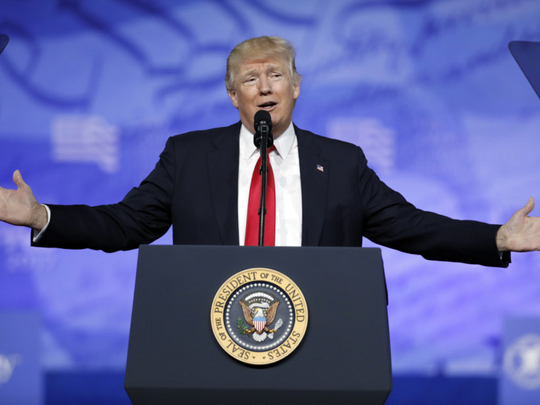
One of the most striking aspects of Donald Trump’s presidency is something which is only now coming into focus: the degree to which the president’s top policy aides often seem to be at odds with him.
Indeed, when it comes to foreign policy it has sometimes seemed as though this is an administration without a president. One in which the secretaries of state and defence, the UN ambassador and the vice-president have been left to run things themselves while their nominal boss plays golf, shouts at the media and feuds with a department store that opted to stop selling his daughter’s clothing line.
When the widely-respected Lieutenant-General H.R. McMaster replaced Michael Flynn as National Security Adviser last week the cycle seemed complete. Within days American newspapers were reporting that McMaster does not share his predecessor’s (and Trump’s) apocalyptic view of Islam and that cooperation with Middle Eastern allies rather than belligerent confrontation was going to be the order of the day.
In the days before McMaster settled into his West Wing office Vice-President Mike Pence was busy in Europe reassuring both the North Atlantic Treaty Organisation (Nato) and the European Union (EU) that the new administration does not wish them ill. Defence Secretary James Mattis was in Baghdad telling Iraqis to ignore President Trump’s frequent musings about “taking” their country’s oil.
Around the same time UN Ambassador Nikki Haley reassured the Security Council that Washington still backs a two-state solution to the Israeli-Palestinian conflict, despite the fact that the president said pretty much the opposite a day earlier (as Israeli Prime Minister Benjamin Netanyahu, standing beside him, audibly chuckled).
And a few days after that Homeland Security Secretary John Kelly was in Mexico City reassuring his hosts that the president’s promise of a “military” operation along their shared border did not mean the “military” would actually be involved.
There is a long history of cabinet members, ambassadors and press secretaries being sent out to “clarify” a president’s ill-considered remarks, but with the arguable exception of Haley, that is not what was happening here. Pence, Mattis, Kelly and McMaster were not telling jumpy foreign audiences (or, in McMaster’s case, jumpy career staffers) ‘what the President really meant was...’ They were telling their audiences, basically, to ignore what the president says.
And yet, is that really so surprising? When you strip away the circus-like atmosphere that often surrounds Trump himself, what remains is a pretty conventional right-wing Republican administration. In domestic terms liberals are appalled by pretty much everything Trump says and does. But aside from the travel ban (which, to be clear, is no small thing) most of the new administration’s policies — on abortion, tax cuts, health care and immigration, to cite only the most obvious examples — are pretty much exactly what a President Jeb Bush or Scott Walker would be doing right now.
Foreign policy more centrist
Foreign policy is more centrist. It is less prone to dramatic swings when the party in the White House changes. So the results are less dramatic, but equally predictable: take Trump himself out of the equation and you are left with a team that leans to the right but does little to challenge the status quo it inherited from Obama, just as Obama talked a lot about dismantling George W. Bush’s legacy while quietly continuing many of his key policies. Mattis and McMaster in particular are people one can easily imagine holding their current jobs under President Hillary Clinton.
Looked at that way their statements over the last two weeks — along with those of Pence, Kelly and Haley — seem designed to emphasise this message for sceptical foreign audiences.
The question is whether all this is sustainable. The most fascinating political moment of the last week was the appearance at a conservative conference by Trump’s normally reclusive senior strategist, Steve Bannon, who is widely regarded as the most powerful figure in Trump’s inner circle. In his remarks Bannon painted a picture of a White House determined to roll back what he called the “administrative state” — fundamentally reducing the scope of government, altering its priorities and radically changing the way Washington engages with the rest of the world.
None of that is in tune with the way the foreign policy team is presenting the new administration to adversaries and allies alike. The question is which set of views will prevail over time. The idea that level-headed cabinet officials can simply run things on their own while their volatile boss goes his own way might seem comforting, but it is hard to see it lasting for long. Sooner or later there will be a disagreement that cannot be resolved by hanging up on the Australian Prime Minister or Trump will say or tweet something snide about a world leader thinner-skinned than Angela Merkel. Sooner or later there will be a fast-moving crisis that requires a quick and level-headed response. At that moment only the president will be able to give the necessary orders, and who will have the president’s ear?
‘Ignore what the president says and steady as she goes’ has worked as a foreign policy for the last six weeks. It is not going to work forever.
Gordon Robison, a longtime Middle East journalist and US political analyst, teaches political science at the University of Vermont.










